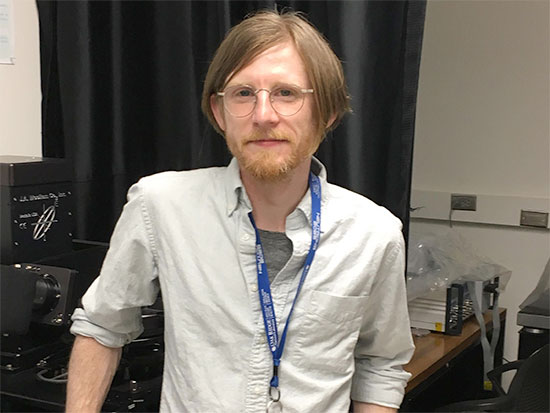 At the massive Neutron Spallation Source at Oak Ridge National Laboratory, a linear particle accelerator boosts protons to about 90 percent of the speed of light. Those protons gather in an accumulator ring, and then they are shot at a target of liquid mercury to produce a beam of neutrons. Higgins will use the beams to probe the internal structure of polymer films.William “Will” Higgins of the University of Alabama at Birmingham is one of 60 graduate students nationwide to win awards from the U.S. Department of Energy to conduct part of their graduate thesis research at DOE federal laboratories.
At the massive Neutron Spallation Source at Oak Ridge National Laboratory, a linear particle accelerator boosts protons to about 90 percent of the speed of light. Those protons gather in an accumulator ring, and then they are shot at a target of liquid mercury to produce a beam of neutrons. Higgins will use the beams to probe the internal structure of polymer films.William “Will” Higgins of the University of Alabama at Birmingham is one of 60 graduate students nationwide to win awards from the U.S. Department of Energy to conduct part of their graduate thesis research at DOE federal laboratories.
Higgins, a fifth-year graduate student in the lab of Eugenia Kharlampieva, Ph.D., associate professor in the Department of Chemistry, will study at the Oak Ridge National Laboratory in Tennessee, working with John Ankner, Ph.D., lead instrument scientist. There they will use beams of neutrons to study the structure and dynamics of thin multilayer films of polymers made by Higgins, and synthesize novel polymers with increased reflection of neutrons.
 Will HigginsHiggins is the first UAB student to win one of these DOE research awards out of 372 awardees since 2014.
Will HigginsHiggins is the first UAB student to win one of these DOE research awards out of 372 awardees since 2014.
At UAB, the Kharlampieva lab makes multilayer polymer microcapsules and thin films for potential use in drug delivery, immune modulation and biomedical engineering. Kharlampieva creates her novel materials while working at the intersection of polymer chemistry, nanotechnology and biomedical science.
“Our films all swell or shrink in response to various stimuli, like pH or temperature, or ionic species present in water,” Higgins said. “You can change how much they swell by changing the internal organization. One benefit of Oak Ridge is it has neutron reflectometry that allows us to see the internal structure of our polymer systems.”
Neutron reflectometry is one of about 20 instruments using the $1.4 billion Neutron Spallation Source facility at Oak Ridge. The massive complex, which opened in 2007, includes a linear particle accelerator that boosts protons to about 90 percent of the speed of light, a proton accumulator ring and a target of liquid mercury. The facility was built through a partnership of six DOE national laboratories: Argonne, Brookhaven, Lawrence Berkeley, Los Alamos, Oak Ridge and Thomas Jefferson. These six are based in Illinois, New York, California, New Mexico, Tennessee and Virginia, respectively.
Higgins will work at Oak Ridge from June through December. He says his study will be an important part of his Ph.D. thesis, and his findings should help research in the Kharlampieva lab.
The DOE’s Science Graduate Student Research Program provides support for inbound and outbound travel to the laboratory, and a monthly stipend of up to $3,000 for general living expenses while at the host DOE lab. The program prepares graduate students for science, technology, engineering or mathematics careers critically important to the DOE Office of Science mission.
Higgins aims to write his thesis next winter and graduate in May 2019.